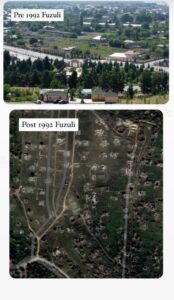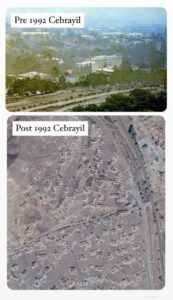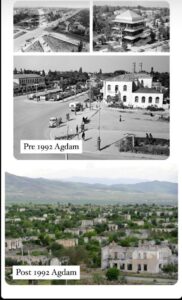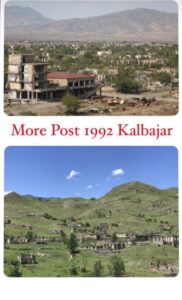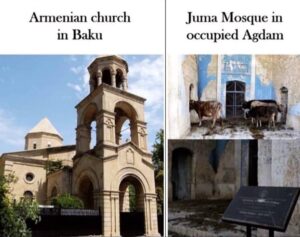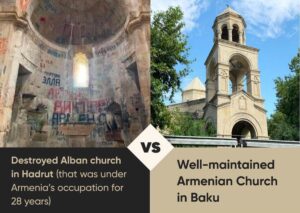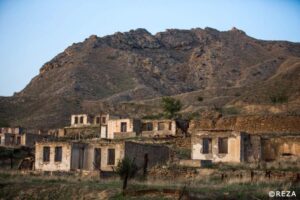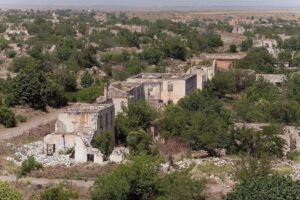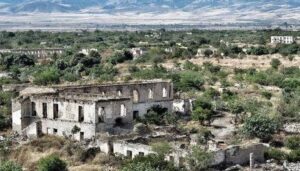Joint Statement
(263 independent students & 10 organizations from Europe)
and
Official Letter to the European Students’ Union regarding their Statement on the Nagorno-Karabakh conflict between Armenia and Azerbaijan
Dear European Students’ Union Executive Committee,
We, as Azerbaijani students in the EU and alumni in the Netherlands, Belgium and Luxembourg, express our concern about your official statement regarding Nagorno-Karabakh conflict between Azerbaijan and Armenia. Aside from the misinformation contained in above-mentioned statement, we all know and strongly believe that European Students’ Union is a diverse, democratic and open-minded umbrella organization, aim of which is to represent and promote the educational, social, economic and cultural interests of students at the European level, at least this is the information given according to ESU’s official site and social media accounts and its statements. We are very disappointed that an organization, mission of which is to protect the rights of students, which is open to all students, regardless of political persuasion, religion, ethnic or cultural origin, sexual orientation or social standing, violates its aims and principles, its objectivity by sharing a statement that contains information without any factual basis on such a sensitive topic.
We would like to point out the misleading content in the statement. We will share some points with you which are confirmed by the whole world and international law:
- Between 1988-1994 Armenia occupied 20% of the internationally recognized territory of Azerbaijan and ethnically cleansed approximately 800,000 Azerbaijanis from those areas. Armenia occupied not only the territory of former Nagorno-Karabakh Autonomous Oblast (NKAO), the status of which Armenia tried to dispute, but also seven additional seven adjacent districts outside NKAO (Lachin, Kalbajar, Aghdam, Fuzuli, Jabrayil, Gubadli and Zangilan). In order for “executing the right for selfdetermination” of 140 thousand ethnic Armenian population of Nagorno-Karabakh, Armenia evicted 700 thousands Azerbaijanis from their homes, and causing them to slowly perish in camps and other temporary shelters for around 30 years. Four UN Security Council resolutions (822, 853, 874, and 884) adopted in 1993 demanded immediate, complete, and unconditional withdrawal of Armenian troops from the occupied territories of Azerbaijan.These resolutions were renewed by the UN in 2008, again demanding the withdrawal of all armenian forces and reaffirming the territorial integrity of Azerbaijan.
- Azerbaijan was loyal to peace process for three decades that were based on Madrid Principles proposed by the Minsk Group of OSCE to settle Nagorno Karabakh conflict. The principles consisted of returning the seven districts around Nagorno-Karabakh to Azerbaijani control, providing NagornoKarabakh with an interim status, returning all refugees and displaced people to their former places of residence etc. However, the peace process got into stalemate following open and unilateral rejection of Madrid Principles by current Armenian prime minister Nikol Pashinyan who came into power in 2018. Nikol Pashinyan’s and his government’s nationalist rhetoric, militarism and populism eventually caused a new war in Nagorno-Karabakh. Davit Tonoyan, defense minister of Armenia had declared in front of the Armenian community in New York: “As the minister of defense, I announce that this [old] format, territories [in exchange] for peace, I have rephrased it. We are doing the opposite – a new war for new territories.” This threatening speech anticipated new military provocations by Armenia to seize new territories at the expense of Azerbaijan. The statement indeed followed with the military hostilities in July in northwest Tovuz region of Azerbaijan, away from Nagorno-Karabakh, at immediate border of Armenia and Azerbaijan which was peaceful for three decades. Pashinyan’s statement in August 2019 that “Nagorno-Karabakh is Armenia, and that is all.” was final blow to peace process and a rejection of the OSCE’s Madrid Principles, according to which the territories’ final status would be the product of negotiations.
- After the ethnic cleansing Azerbaijanis from these territories, many historical monuments were destroyed, turned into ruins in the occupied territories. have been turned into ruins. In the letter it is mentioned, “We believe that this can give students from both countries opportunities to learn to live AZSAB.ORG [email protected] together in a democratic and multicultural society…” How can Armenia, a mono-ethnic country whose population is almost 99 percent Armenian, can judge about tolerance? Unlike Armenia, there are 30,000 Armenians living in Azerbaijan today along with hundreds of thousands of other ethnic minorities. Armenia is currently trying to turn this war into a religious issue and describe it as a Muslim-Christian conflict. The current state of demolition and desecration of mosques in the occupied territories of Azerbaijan shows the complete opposite. Despite this, the Armenian church is well-maintained and still operates in the center of our capital city, Baku. Azerbaijan has been inhabited by representatives of different religions and cultures throughout history, demonstrating a deep heritage of coexistence among different religions. You can see the attached examples to this mail.
- Today’s war is going on within internationally recognized Azerbaijani borders for returning territories of Azerbaijan, the Azerbaijani army by using its self-defense right and fighting to restore the peace in the region. Indeed, as mentioned in the letter, it is the bloodiest war in the last decade. Azerbaijan was mentioned as an aggressor in the paper. Let’s look at the simple statistics:As a result of shelling Azerbaijani civilians outside the conflict zone (Ganja – two times, Barda, Minghachevir, Tartar, Aghdam and other densely populated cities) from the territory of Armenia with ballistic missiles 91 civilians were killed and 405 civilians were injured including 1 infant, 11 children, 27 women and the old. Any direct attack against a civilian or civilian object is not only a violation of International Humanitarian Law but also a grave breach. Direct attacks against civilians and/or civilians objects are categorised as war crimes. We have to make clear that these regions do not belong to the Nagorno-Karabakh territory and by attacking these regions, Armenia illegally expands the scope of military operations. The Amnesty International and the Human Rights Watch confirmed the first banned clusters used by Armenia targeting Azerbaijani civilians. If you really care about human rights and civilians from both countries and want to keep “neutrality”, you should have mentioned war crimes against Azerbaijani civilians committed by Armenia starting from 27th September, instead of falsely accusing Azerbaijan.Please pay attention to the Statements of The Amnesty International and Human Rights Watch about the use of banned clusters by Armenia against Azerbaijani civilians.
- The Statement builds on dubious allegations about the deployment of Syrian fighters in Azerbaijan, without any proof. Staged video recordings of interrogation of such mercenaries don’t stand any criticism. Instead, the Armenian political leadership made clear on numerous occasions that Armenian fighters from various countries, including from the Middle East are deployed in the conflict zone. An ethnically Armenian while being the national of a different country is clearly considered to be mercenary under international law if he takes part in a conflict on the territory of a foreign country. Can ESU provide us with any official and reliable sources as a proof of these claims against Azerbaijan?
- Turkey does support Azerbaijan politically but so does Israel, Georgia, Ukraine, etc. However, claiming Turkey’s military support has no grounds because those who have such claims have not presented any evidence to support this claim. It is a shame to even add some fake news shared by Armenia government in your official letter. This goes against the EU university standards where no claim should be made without a reputable reference.
- Quote from the letter “Institutions and media in Azerbaijan have continued using hate speech against Armenia” – again false. Recently, two extremist nationalists have been convicted for hate speech against Armenians. Of course, we condemn hateful speech against any of our minorities. However, despite the fact that there are thousands of Azerbaijani families who lost their family members between 1988-1994 during the most brutal war committed by Armenia, the majority of the population condemn hate speech and this is not common and forbidden by the Azerbaijani government.
It is ironic when Armenia calls for peace while ethnically cleaning nearly 1 million internally displaced Azerbaijanis from their homes, turning the occupied region into ruins, and rejecting the peaceful work of 27 years led by the International groups. Azerbaijan has always been and today is supporting a peaceful solution to restore peace and its internationally recognized borders.
By issuing a statement based on absurd arguments, which is not supported by any international organization or an institute, the European Students’ Union loses its validity to speak on behalf of millions of students. The one-sided statement of this organization leaves us no other choice but to assume that it serves to the sole goal of disguising the illegal acts and war crimes committed by Armenian leadership and the military, which continues its vicious attacks against the civilian population of Azerbaijan, located far away from the conflict zone. It is worth reiterating that more than 91 Azerbaijani civilians were killed, and hundreds were wounded. Though these stats outnumber those in Armenia by far, we stress that the Azerbaijani students deplore any loss of civilians from both sides. But this is probably not in the interest of the ESU to base its statement on the real facts, but rather talk about the Armenian nonsense. When you address such a large audience, it is unacceptable for you to share misinformation with people and not realize this serious responsibility. If you want to restore the peace in the region, firstly, you have to research what international law is saying about this conflict and you need to know all facts from both countries’ sides. This is the only way to keep neutrality.
While checking European Students’ Union representatives, we found out that Gohar Hovhannisyan (Armenian) is leading the European Students’ Union. It is unfortunate if she is using her power to mislead the European Students’ community with this letter where the main points of the conflict are being hidden and claiming false information without pointing any reputable source. All Board members of this Union, including Gohar Hovhannisyan must know that when leading such an influential organization, everyone must be able to distinguish between subjective and biased opinions and work, this is what we call Professionalism.
Once again we inform that this is disrespectful not only to the students, but to the whole Azerbaijani people. We urge you to take further actions immediately in order to stop the abuse of power by Ms.Hovhannisyan, the spread of misleading information. We demand that the ESU withdraws its misleading statement and apologizes to all students of Azerbaijan for this biased approach. We also demand all organizations who seconded this statement to apologize especially before IDPs of Azerbaijan for the pain and insult caused by this statement.
We inform you that this issue will be raised before the European institutions, which act as your donors so that all those responsible for such an unlawful and derogatory statement are held accountable for this misdeed.
Proposed by: AzSAB – Azerbaijani Students & Alumni of BeNeLux.
Seconded by: ASB & AHB from Spain, MAS & BAS from the UK, SANA from Sweden, ASCE MTU from Estonia, European Law Students’ Association Alumni Society in Azerbaijan, Erasmus Student Network Alumni Society in Azerbaijan, AEGEE-European Students’ Forum Alumni Society in Azerbaijan and ASYOU.
The list of signatures of Azerbaijani Students and Alumni of Europe:
- Agshin Garayev
- Aisha Atamaliyeva
- Ali Gadziev
- Ali Hasanov
- Aliabbas Shukurlu
- Alish Najafzade
- Alishan Karimov
- Anar Alizade
- Anna Kantsemal
- Arslan Abdulla
- Arzu Aliyeva
- Asmar Abdullayeva
- Asmar Bayramova
- Aydan Alakbarova
- Aydan Behbudova
- Aydan Islamova
- Aydan Sadigova
- Aysel Abdulzade
- Aysel Gurbanzade
- Aysel Mehdiyeva
- Aysha Hasanova
- Ayshan Yariyeva
- Aytac Hasanova
- Aytaj Tamirova
- Aytaj Yusifova
- Aytan Hajiyeva
- Aytan Mammadova
- Ayten Sultanli
- Aytən Novruzova
- Azima Teyyubova
- Bakhtiyar Garashov
- Banovsha Habibova
- Banovshə Ahmadova
- Bayram Bakhshaliyev
- Bayram Orujov
- Chinara Ganbarova
- Chinara Shukurova
- Chingiz Mammadli
- Davud Shikhmammadli
- Dilafruz Yusifzada
- Elchin Latifli
- Eldar Mustafaoghlu
- Elmikhan Mammadov
- Elnara Rafizada
- Elnur Hajiyev
- Elnur Valikhanli
- Elshan Gurbanov
- Elvin Abbasli
- Elvin Abdullayev
- Elvin Mammadli
- Elvin Mammadzada
- Emin Ahmadli
- Esmira Babazade
- Esmira Isgenderova
- Ezel Rustamova
- Farahim Suleymanli
- Farhad Huseynov
- Farid Gasimov
- Farida Mustafazade
- Fatima Bayramova
- Fatima Hamidova
- Fatima Shukurlu
- Fazila Ismayilova
- Fazila Pashayeva
- Fidan Adishli
- Fidan Algayeva
- Fidan Aslanova
- Fidan Bayramova
- Fidan Mammadova
- Fidan Rahimli
- Fidan Taghizada
- Fuad Budagov
- Gabriella Quliyeva
- Gismat Ahadov
- Gulagha Gozalov
- Gulgun Farziyeva
- Gulgun Mammadli
- Gulkhanim Abishova
- Gulnar Alizade
- Gulnar Hajiyeva
- Gulnar Mammadova
- Gulnar Velijeva
- Gulshah Babayeva
- Gulshan Muslumzade
- Gulsum Alihuseynova
- Gultaj Ibrahimova
- Gunay Bayramova
- Gunel Hasanzade
- Gunel Mammadova
- Gunel Mirzazada
- Gunel Zeynalova
- Gurban Abbasov
- Hafiz Valizada
- Hajarnur Pashayeva
- Heidar Huseynov
- Hijran Musayeva
- Hikmat Hasanov
- Hokuma Mammadzada
- Humay Khalilli
- Huseyn Mashadiyev
- Ibrahim Azimov
- İbrahim Huseynov
- Ibrahim Mammadov
- Ilaha Bakhshaliyeva
- Ilaha Guliyeva
- Ilyas Alizada
- Ismayil Aghahasanli
- Ismayil Aliyev
- İsmayil Mammadov
- Ismayil Tahmazov
- Jala Tahirova
- Jalal Sadigli
- Jamil Ismayilzada
- Javid Abdullayev
- Javid Aslanli
- Jeyhun Babashov
- Jeyla Samedzade
- Kamala Samadova
- Kamran Rahimov
- Khayala Agaverdiyeva
- Khoshgadam Allahverdiyeva
- Lala Mustafazade
- Lalazar Hamidova
- Lale Sariyeva
- Laman Gudratova
- Lamiya Mahmudova
- Leman Humbatova
- Leyla Baghirli
- Leyla Rahimli
- Madina Hasanli
- Mahbuba Jafarova
- Mahir Huseyov
- Majnun Abdurahmanov
- Maleyka Alizade
- Maryam Ismayilzada
- Matin Karimov
- Mikayil Isgandarov
- Mirniyaz Mahmudlu
- Murad Aslanli
- Murad Babayev
- Musa Suleymanov
- Mustafa Cəbrayılov
- Nahida Mamishova
- Nargiz Bakhishova
- Nargiz Kazimova
- Nargiz Mirzayeva
- Nargiz Umudova
- Narmin Mammadli
- Narmin Mehtiyeva
- Narmina Baghirova
- Narmina Karimova
- Natavan Ahmadova
- Natavan Ismayilzada
- Natavan Zeynalova
- Nazrin Gasimova
- Nazrin Najafzade
- Nigar Ahmadli
- Nigar Mir-Babayeva
- Nigar Muradkhanli
- Nigar Nebiyeva
- Nigar Shukurova
- Nihad Guliyev
- Nijat Jafarli
- Nijat Mammadbayli
- Novruz Mamishov
- Nuray Haqverdiyeva
- Nuray Haqverdiyeva
- Nurjan Khalilzada
- Nurlan Abdullayev
- Nurlan Kerimov
- Nurlan Mikayilov
- Orkhan Aliyev
- Orkhan Gasimov
- Orkhan Rustamov
- Pakiza Hajiyeva
- Parviz Hajiyev
- Pinar Majidova
- Polad Mahmudov
- Rahida Mammadli
- Rahil Mammadov
- Rahim Heydarov
- Rahim Huseyinsoy
- Ramil Namazov
- Ramil Pashayev
- Ramin İmamquliyev
- Rashid Mechtijev
- Rasul Agharzayev
- Ravid Nahmatov
- Ravid Taghiyev
- Rima Mammadova
- Rovshana Aliyeva
- Rugiyya Abdullayeva
- Ruhiyya Suleymanova
- Rustam Asadli
- Rustam Jabbarov
- Sabina Ibrahimova
- Sabina Kazimova
- Sabina Mammadova
- Sabuhi Mursalli
- Sabuhi Osmanov
- Sadig Eyvazov
- Sakina Khanim
- Sakina Mammadli
- Sakina Mustafayeva
- Sama Khalilova
- Samir Azizov
- Samir Sharifli
- Samira Nazarli
- Sanam Amirli
- Sanan Abdullayev
- Sanan Salimov
- Sanan Suleymanli
- Sara Mehdiyeva
- Sattar Mammadov
- Sevda Mirzayeva
- Sevda Seferova
- Sevinj Aghayeva
- Sevinj Aghayeva
- Sevinj Jafarli
- Sevinj Mammadova
- Sevinj Mastiyeva
- Şəbnəm Mehralıyeva
- Shabnam Mehraliyeva
- Shahana Huseynzade
- Shahin Mammadli
- Shahsenem Rasulova
- Shamil Farzaliyev
- Shamil Mustafayev
- Shamistan Ahmadov
- Sumaya Quliyeva
- Suru Hajiyeva
- Tahir Valiyev
- Tahmasib İmamaliyev
- Tamara Aslanova
- Tamara Danilyuk
- Tamara Makinskaya
- Tamkin Aslanli
- Tarlan Ahmadov
- Toghrul Aghakishiyev
- Togrul Kalbaliyev
- Tokay Ahmadov
- Tukaz Ahmadova
- Tural Ismayilov
- Turan Karim
- Turana Pashayeva
- Turgut Taghizade
- Turkan Qurbanzada
- Tutukhanim Balayeva
- Ulkar Aligulova
- Ulkər Sharifli
- Ulvi Mustafayev
- Vafa Garayeva
- Valik Mancharov
- Vugar Aliyev
- Vugar Mammadov
- Vusal Asgarov
- Yashar Baxshiyev
- Yasin Guliyev
- Yusif Israfilbayov
- Zahra Iskandarli
- Zeynab Abdullayeva
- Zeynab Mammadova
Annex: Pictures from Kalbajar, Fuzuli and Aghdam cities.
